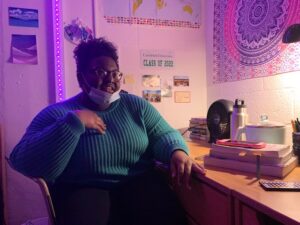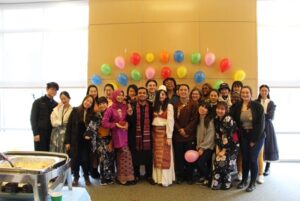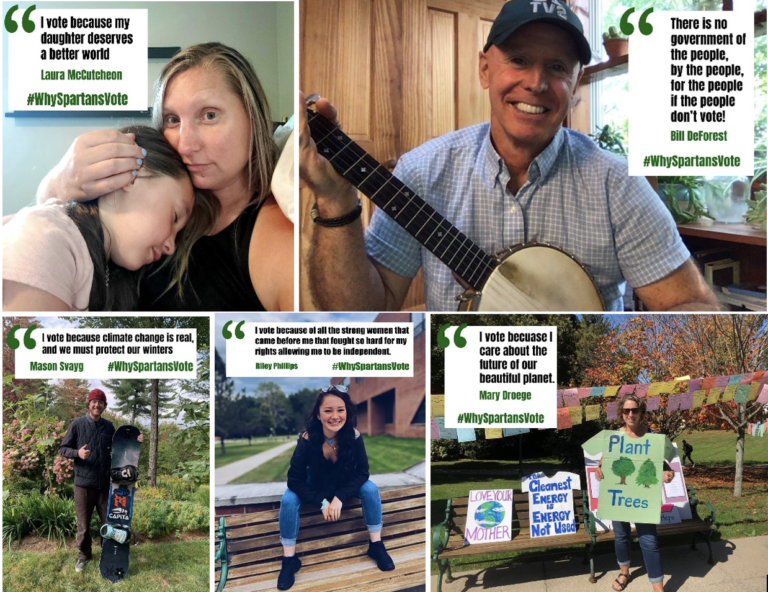Adapting to America

“One time, I went to my history teacher in high school and asked him if he could give me a rubber. He looked at me and said, ‘You mean an eraser?’
“I was a little shocked because I didn’t know that rubber meant a condom,” said D’Andra Brown, one of several international students at Castleton University.
Brown moved to the United States from Jamaica in her senior year of high school and is studying social work and sociology. Her story of mixed word meanings isn’t as surprising as it sounds because it’s something lots of international students go through.
Every international student agrees that there is a big culture shock when moved from another country to the U.S. If you’re having a conversation with an international student, the words “in my culture,” “in my language,” and “in my country” are very common.
That is because they came from a society that has a very different perspective from the rest of the world. Culture is a norm that the people in a certain country follow. It could be the way they dress, the food they eat, the way they celebrate their holidays; it’s just very specific and unique to that country.
It’s also a glimpse of the way their society looks at the world and how the people of that society understand it. As much as it’s very unusual for Americans to understand other cultures, a lot of international students find the American lifestyle very strange and surprising.
For instance, in America, sex and pregnancy are very common among teenagers. Everyone is very open and honest about it. In Ethiopian culture, it’s considered a sin to have sex before marriage. It’s even worse when it’s a young girl less than the age of 18. The judgments of the society will demoralize her, even though her parents are okay with it.
Which culture is better? That’s a judgment call.
Respect is a significant aspect of many African countries. Children who grew up there are taught to give respect to anyone even though they are not a part of their family.
“Americans feel offended when people don’t look at them in the eye when having a conversation with them. I find that very weird,” said Narou Diop, a student from Senegal.
“Most people here don’t understand the value we give to our conversations with an elderly person. In my culture, it’s considered disrespectful if a young person is having an eye-to-eye conversation with someone that is much older than them. It’s not that they’re scared to talk, it’s just out of respect,” Diop added.
The way you greet someone is another way of showing respect. A normal greeting outside the U.S. would be a simple “hi” or “hello.”
The question “How are you?” however, is used to initiate a conversation with someone.
When it comes to greetings here, Americans ask, “How are you?” and although posed as a question, it is not literal. It is just a way of them saying “Hi.” International students find this very confusing because of the grammatical way they were taught English.
Even though it differs from one country to another, food plays a major role in the well-being of an individual. After moving to the U.S from another country, it may take a while to get used to what Americans consume. Especially, for people who are not used to eating processed foods.
Like the “freshman 15,” “International 15” can also be a thing. A lot of students tend to gain weight after a couple of months of being in the U.S because of the high sugar and fat content of the food. In many African countries, the meals are freshly cooked and organic. Therefore, students who come from Africa struggle with the inorganic nature of the food in America.
“Americans love their cheese. Most of the things they eat have something to do with cheese and I don’t know why,” said Diana Martinez-Mantrana, another international student from Cuba.
Although there are many ethnic markets across the United States, it’s so hard to find African markets in small states like Vermont. Usually, people who live in these small states order the products online, but some things are only found in the stores. Therefore, they drive to another state to get them.
“We literally have to drive to Albany or Boston to get one or two ingredients when we want to cook. Here in the Castleton or Rutland area there is a farmers’ market on Saturdays but they are limited on resources and lacks diversity,” Martinez-Mantrana added.

Being an international student is a lot by itself, but some students say it can be worse in the U.S. They have to change how they talk, how they eat, and how they act. In general, they will have to drop the norm they grew up in and be more American to fit in with their environment. It’s something they say they have to learn through experience rather than a textbook.
“I had to learn how to take things with a grain of salt,” Brown said.






